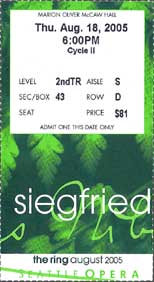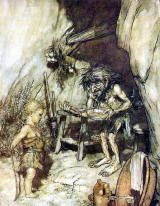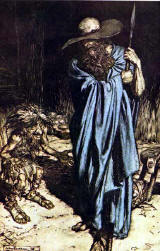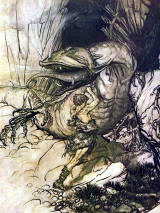|
 |
 |
Siegfried,
the son of Siegmund and Sieglinde, was now a young man.
Mime, Alberich's brother, had raised him since he was a
baby. Siegfried was vivacious and free-spirited, running
around with all sorts of creatures, such as his friend
the bear.
Siegfried was also a lot of trouble for Mime. Mime could not make a good sword
for Siegfried, because Siegfried always broke whatever had been forged. Mime
possessed the fractured pieces of Nothung, but he was totally unable
to repair the sword. He wondered if he could ever manage to get Siegfried to
slay the dragon and fetch the Ring for him! |
Siegfried now wanted to know who he was, since he had seen
his reflection, and he knew he was not a Nibelung. Mime explained
how he had always taken care of Siegfried, since he was young,
teaching him the ways of a blacksmith.
|
 |
Mime
told Siegfried the story of his mother, Sieglinde, and how
she had come to him. She died shortly after he was born, so
he had raised Siegfried since he was a new born.
[Quibble:
Exactly how Mime managed to take care of a newborn baby was
not explained, since he, like his brother, did not
seem to
have
any social
or parenting
skills; he did not even have a wife!] |
 |
While
Siegfried was away in the forest, Wotan, disguised as the Wanderer,
arrived at Mime's camp, with the specific purpose to deduce
how close Siegfried was to retrieving the ring.
Mime viewed the Wanderer as an annoying interloper, so he
gave the man three impossible questions to get rid of him.
Mime explored his knowledge of Nibelungs, his knowledge of
Giants and Fafner and the gold, and his knowledge of the gods
and Valhalla. The Wanderer in turn, asked Mime to show his
knowledge of all the events of the two previous operas, leading
up to the arrival of Siegfried into his care.
This was all an exercise so that the Wanderer
could emphasize that only Siegfried, who had no fear, had the
power to repair Nothung.
|
 |
Despite
the fact that Mime had raised him and cared for him all his
life, Siegfried was quite ungrateful; he despised the Nibelung.
He was constantly upset over Mime's inability to forge
a decent sword for him.
[Quibble:
The circumstances of this story do not seem to justify Siegfried
becoming a psychotic spoiled brat!]
Finally, after lengthy explanations from Mime, Siegfried finally
came to understand that the repair of Nothung was a task that
only he could carry out. |
 |
Finally,
Siegfried began the task of reforging Nothung, which
led to one of the longest and most dramatic arias in the
opera.
Also, Mime tried to carry out his promise to Sieglinde that
he would teach Siegfried the meaning of fear, but this turned
out to be an impossible
task.
At last, Siegfried had put Nothung back together. As a
test of his creation, he deftly swung the shiny blade and cleaved the bulky metal
anvil into two halves.
|
 |
Alberich
maintained his constant vigil of Fafner's cave, as he dreamed
of getting the Ring back. The Wanderer appeared, whom Alberich
immediately recognized to be Wotan, and the two exchanged angry
words. Always trying to work his angles, Wotan even tried unsuccessfully
to strike a deal with Fafner.
After Alberich and Wotan left, Siegfried and Mime arrived.
Fafner came out of his cave and warned Siegfried of treachery.
At Seattle Opera, Fafner was an enormous, partially-obscured
winged dragon, whose teeth looked like long tusks.
Siegfried plunged Nothung into Fafner's
chest and killed him instantly. |
 |
Unlike
in some versions of the saga, Siegfried did not bathe in
the dragon's blood; singers really did not want to be soaked
in red-colored liquid.
However, Siegfried did manage accidentally to get a taste of
the dragon's blood, by which he developed a new ability to
understand
the
language of birds.
High in a tree, a bird explained all about the hoard of the
gold, the Tarnhelm, and the Ring to Siegfried.
While Alberich and Mime argued about the hoard, the bird told
Siegfried to take everything, and to beware of Mime's plan
to kill him. Siegfried declared that he liked Mime less than
Fafner, as he plunged his sword into the Nibelung.
[Quibble:
This had
to be the epitome of ingratitude, especially since Mime was
really no longer threat!]
Siegfried did not pause of consider
his deed, because the bird
lastly told
him
of Brünnhilde,
who would make him a great wife. |
 |
The
Wanderer awakened Erda, as he sought a way out of his predicament,
but Erda was bewildered by Wotan's twisted logic and refused
to help him.
As Siegfried climbed the Valkyrie mountain, he was confronted
by the Wanderer, who attempted to confuse him and to block
his way. Wotan dared Siegfried to pass by his spear, and Siegfried
proceeded
to cut the spear in two, which ended Wotan's power forever.
Finally, Siegfried passed through the guarding flames and came
upon what he thought was a man in armor. As he removed the
armor, he realized that it was Brünnhilde,
a woman. It was a near-fearful rite of passage, because Siegfried
had never gazed upon a woman before.
|
 |
| Brünnhilde awakened
with a kiss from Siegfried. She was overjoyed as she realized
that Siegfried was the hero for which she had waited so long.
Though she still had Grane, she also realized that her former
life was now gone. Her new life as a mortal woman had begun. |
 |
Brünnhilde
and Siegfried jubilantly declared their love for each other.
While
Siegfried might have momentarily experienced fear when he first
saw Brünnhilde, that feeling had now been forgotten.
It was the awakening of sexuality for both of them as they
declared their devotion and love. As Brünnhilde fell
into Siegfried's arms, her former life forever vanished.
[Quibble:
While the goddess Fricka did not physically appear in this
opera; one would have to wonder, what her reaction
would
have
been
to Siegfried carrying on with Brünnhilde, who was actually
his aunt.] |
 |
Siegfried Libretto
Götterdämmerung |
|
|
|